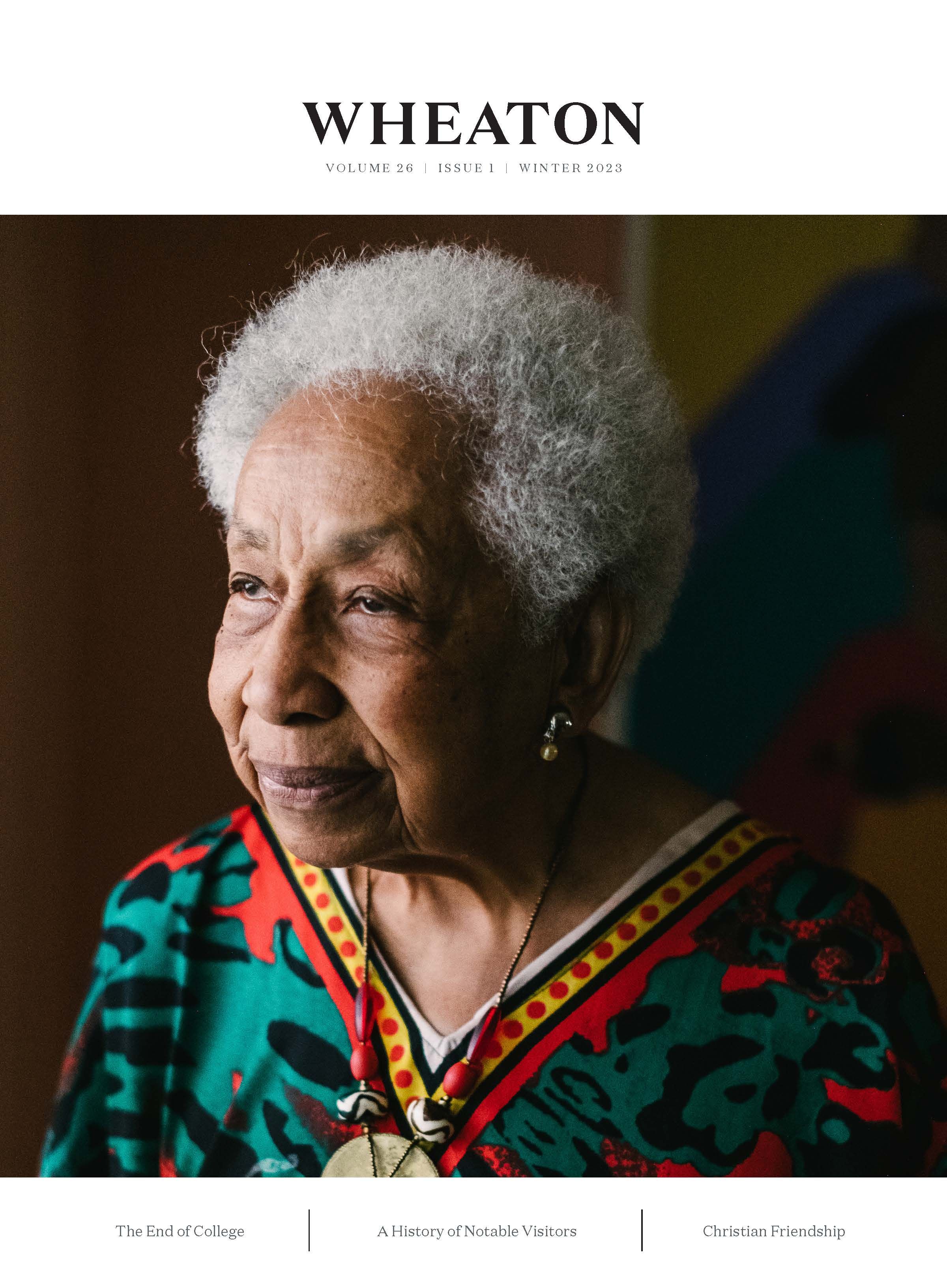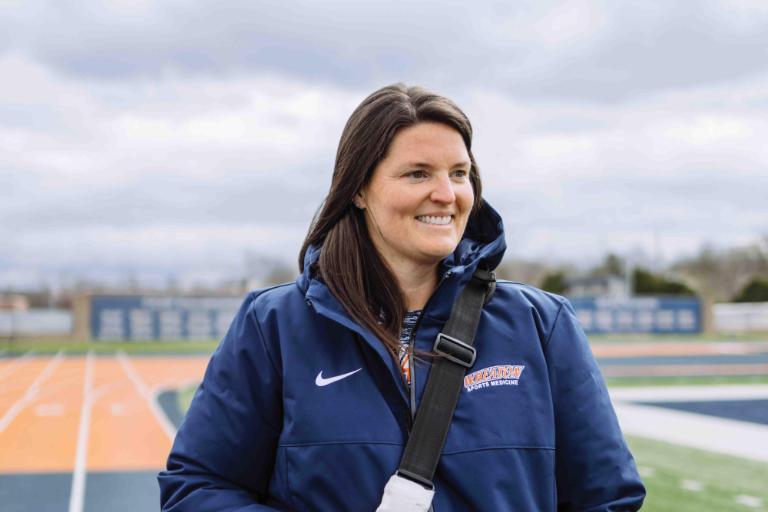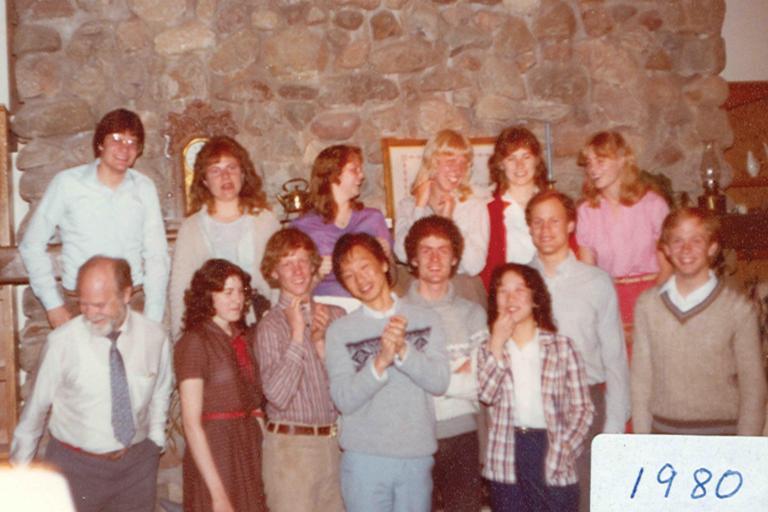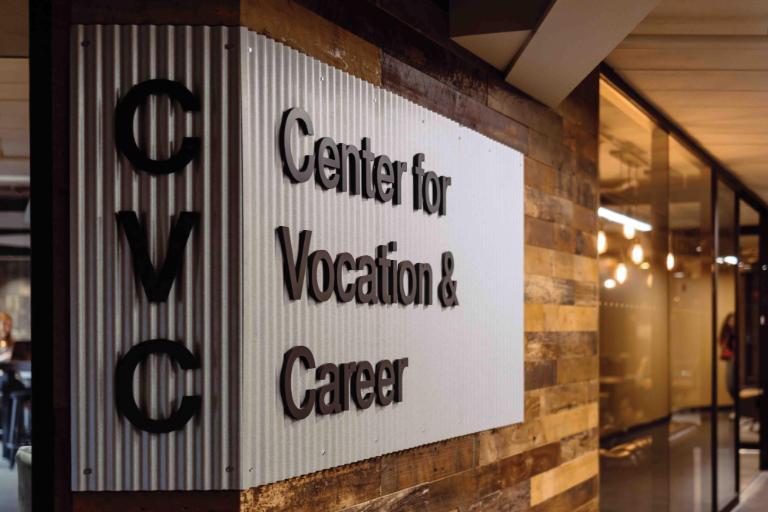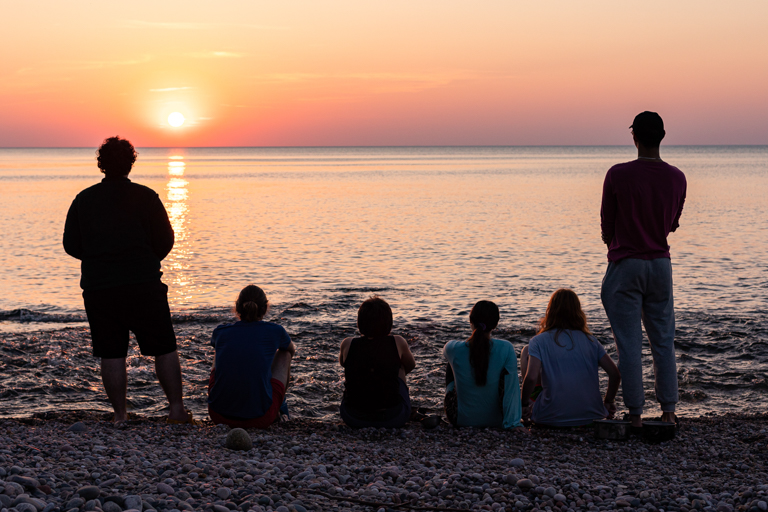A History of Notable Visitors
Words: Melissa Schill Penney ’22
Photos: Buswell Library Archives and Special Collections
Between regular Chapel messages, special guest lectures, speaker series, and commencement, Wheaton College has always boasted a full roster when it comes to speaking engagements. Throughout the years, thousands of visitors have traveled thousands of miles to address the Wheaton community. This feature highlights just a handful of people—from politicians to theologians to authors to entertainers—who have graced the campus from places like the stage in Edman Chapel, the lecterns in Blanchard Hall, and the McCully Stadium field.
THEOLOGIANS
CARL F. H. HENRY ’38, M.A. ’41 maintained close ties with his alma mater throughout his life, returning to speak on various occasions. He was highly influential during the neo-evangelical movement that began in the 1930s, and he became the first theology professor at Fuller Theological Seminary and the first editor of Christianity Today. In 1966, he wrote a reflection on his time at the College for the alumni magazine, saying that “those of us who rubbed elbows on campus had a sense of destiny in the making.”
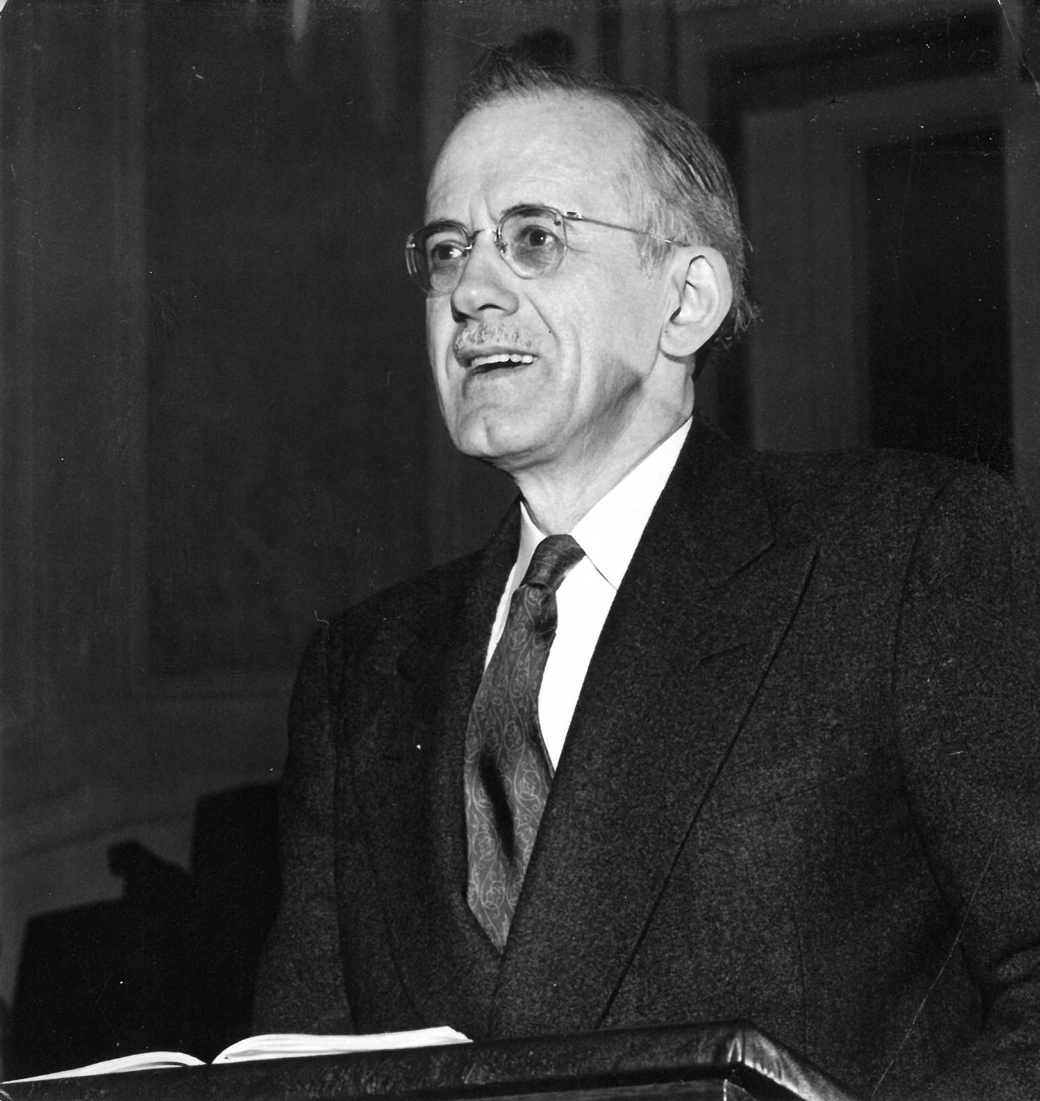
A. W. Tozer at Mid-Winter Convocation
1950
A. W. TOZER, the renowned author and theologian, made several visits to campus. During his 1950 visit for the mid-winter convocation, he was awarded an honorary doctor of letters degree, an especially notable achievement since he never attended college. He also led Spiritual Emphasis Week services several times in the ’50s. Tozer had built a reputation among Wheaton College students, and up until his death in 1963, hundreds of students would flock to his Sunday night services. His messages centered on not just knowing about Jesus but actually knowing Jesus personally.
JOHN STOTT was a highly respected evangelical voice and chaired the international committee that drafted the Lausanne Covenant, the document that launched the Lausanne Movement. When Stott lectured at Wheaton, he often emphasized the importance of academic thought and its potential for spiritual service, as well as the significance of social action in a life of discipleship. Nearly thirty recordings of his lectures are housed in Buswell Library Archives & Special Collections.
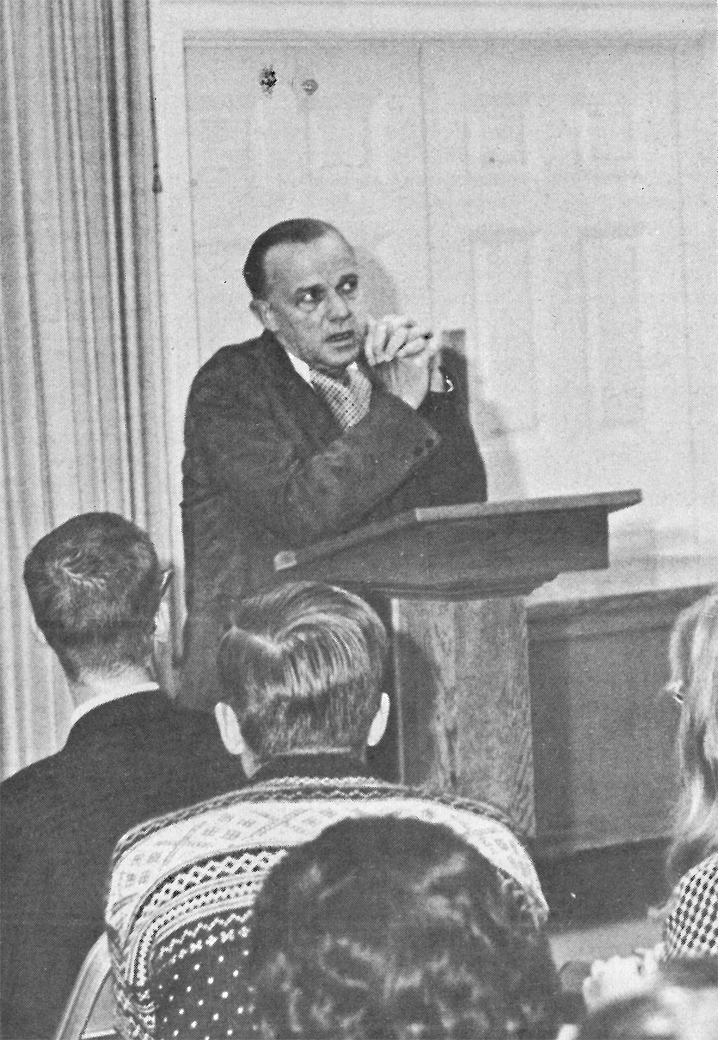
Francis Schaeffer
1965
FRANCIS SCHAEFFER came to Wheaton a number of times between 1963 and 1983. His most famous visit occurred in 1965, the second stop on his speaking tour across the U.S. Schaeffer spoke about the ways that evangelicals could participate in the broader arts and culture scene without betraying theological values, a take that broke down previously perceived barriers between evangelical Christians and contemporary arts like film.
J. I. PACKER gave two Wheaton College Commencement addresses—in 1987 and 2001—and spoke at the 2002 Wheaton Theology Conference, where he delivered “A Personal Retrospective on the Conversation between Evangelicals and Catholics.”
JOHN PIPER ’68 has frequently visited his alma mater to lecture for Chapel and conferences. His messages have covered themes of racial reconciliation, repentance, and missions.
FRANCIS CHAN came to Wheaton College’s commencement in 2013 and spoke to the graduating class on the daily act of relying on God.
CORNEL WEST visited campus in 2014 to give a lecture titled “On being a Chekovian Christian and a Blues Man: Christianity, Pragmatism, and Democracy.” His areas of research and presentation largely revolve around topics of race, religion, and government, and the ways in which they intersect. A graduate of Harvard and Princeton, West’s accolades do not stop at academic accomplishments. In addition to his intellectual pursuits, West is also an actor—appearing in The Matrix—and a hip-hop and spoken word artist.
Author, scholar, and speaker N. T. WRIGHT has been a frequent visitor to Wheaton College. Between Wheaton College Theology Conference presentations and Chapel talks, Wright’s messages span from notes on the cross to reflections on the apostle Paul.
In an effort to foster conversation on Christian unity, CARDINAL FRANCIS GEORGE spoke with reformed theologian John H. Armstrong ’71, M.A. ’73, in 2012 at the College. The event was held in Edman Chapel but hosted by Armstrong’s ministry, ACT 3. While many attendees were encouraged by the dialogue, there was some pushback from those who believed there ought to be a separation between the Protestant and Catholic churches.
ARTISTS
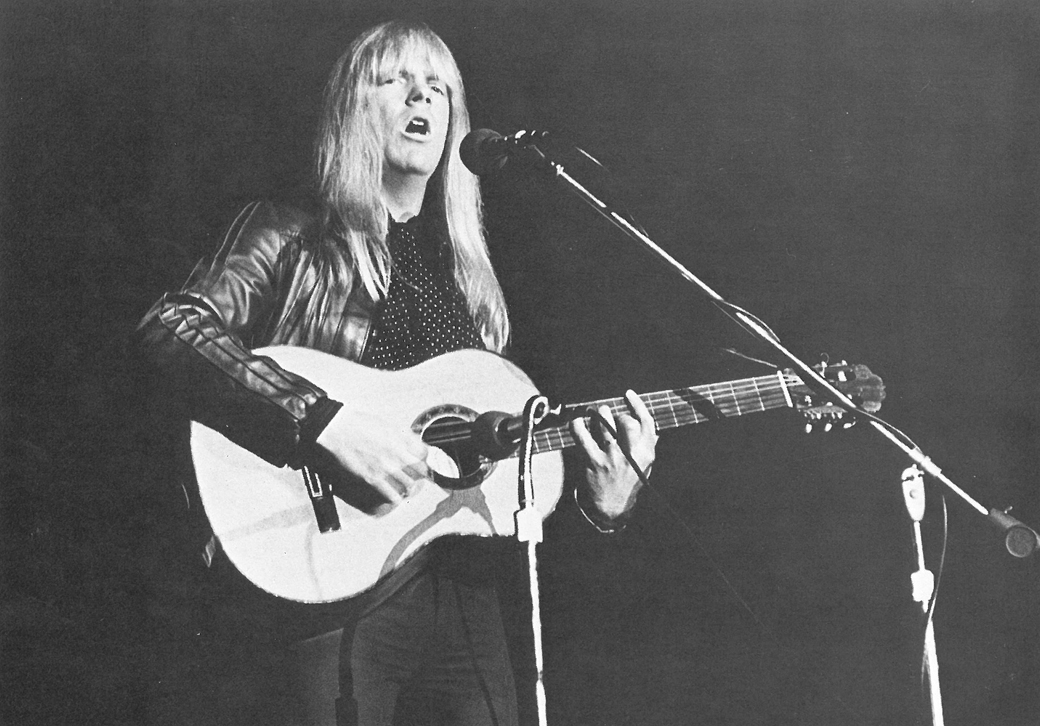
Larry Norman
1977
FRANK GUY ARMITAGE was a rather unique visitor. As a ventriloquist and an impersonator of Charles Dickens characters, he hosted a performance of his popular show, “Queer Folk from Dickens,” in Pierce Chapel in 1938. Before his flourishing career as an entertainer, Armitage served in WWI and was decorated with the Military Cross for his service.
LUCILLE MANNERS was a popular radio singer who gave a concert on campus in 1944. She performed a wide selection of music, pulling in Irish country songs, an Italian opera piece, and English compositions described by the Tower yearbook as “refreshing melodies.”
Popular Christian singer LARRY NORMAN visited Wheaton twice—once in 1977 and again in 1979—to perform concerts “highlighting the gospel message,” as one Record headline described. Recording during the rise of “Jesus Freaks,” Norman was a pioneer of Christian music, releasing over 100 studio and live albums and opening his own record label, Solid Rock Records.
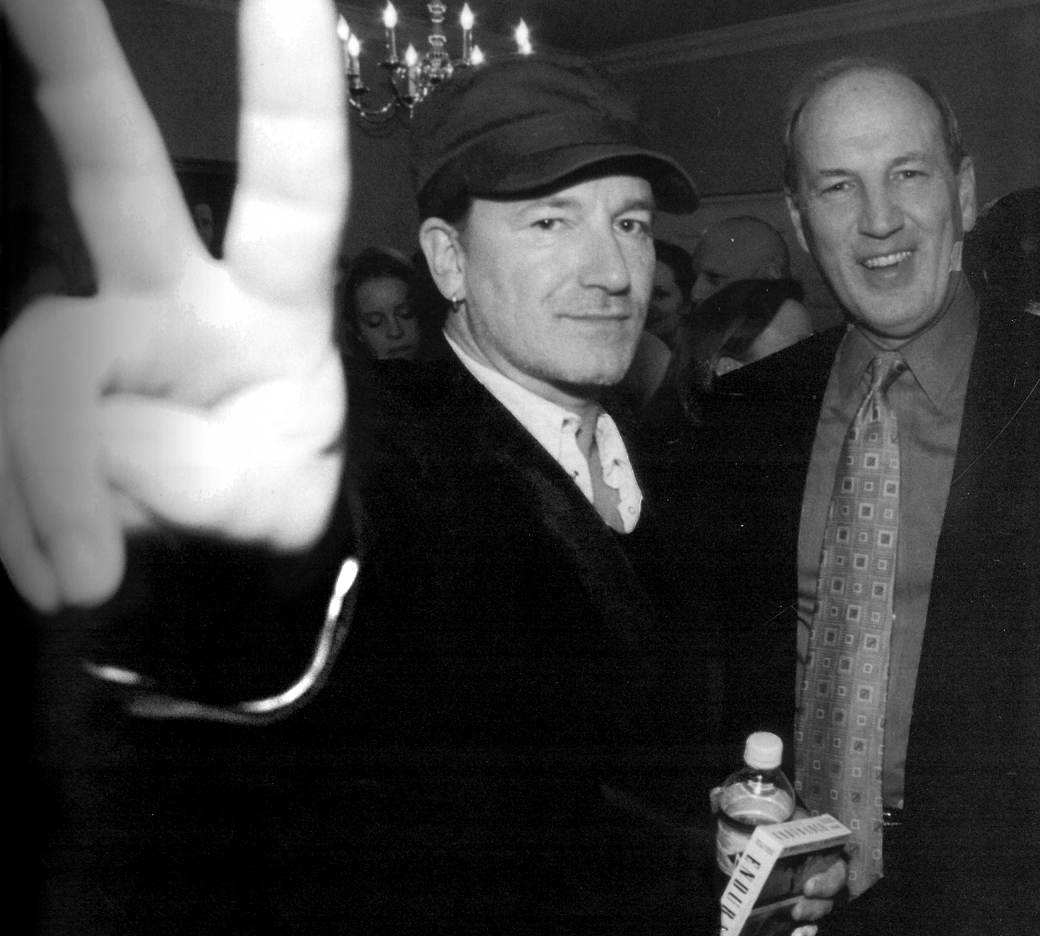
Bono with A. Duane Litfin (seventh president of Wheaton College)
2003
Bono, the iconic singer from the band U2, paid campus a visit during his 2002 Heart of America tour, a Midwestern trek dedicated to raising awareness and money for the AIDS epidemic in Africa. A column in the Chicago Sun-Times written by Cathleen Falsani-Possley ’92 recorded the fanatic reception Bono received. He claimed his Wheaton stop was the best night on the tour: “That was fantastic. They asked tough questions. They asked the things people should be asking.”
Artist MAKOTO FUJIMURA creates paintings that draw from the traditional Japanese style of nihonga, which utilizes water-based paint made from naturally occurring elements and their pigment. In 2016, Wheaton hosted “Stepping into Silence,” an exhibit of Fujimura’s work that was created in response to Shusaku Endo’s Silence. Some of his artwork can also be seen currently on display in Edman Chapel, hanging on either side of the stage.
AUTHORS
W. H. AUDEN visited Wheaton in 1963 for the Lyceum Series, an annual program organized by College Union that brought experts and distinguished speakers to campus. Auden’s poetry was known for both style and content. His interest in science wound its way into the content of his poetry, and he also regularly addressed politics, psychology, economics, and social issues, earning him the title of a social poet and activist.
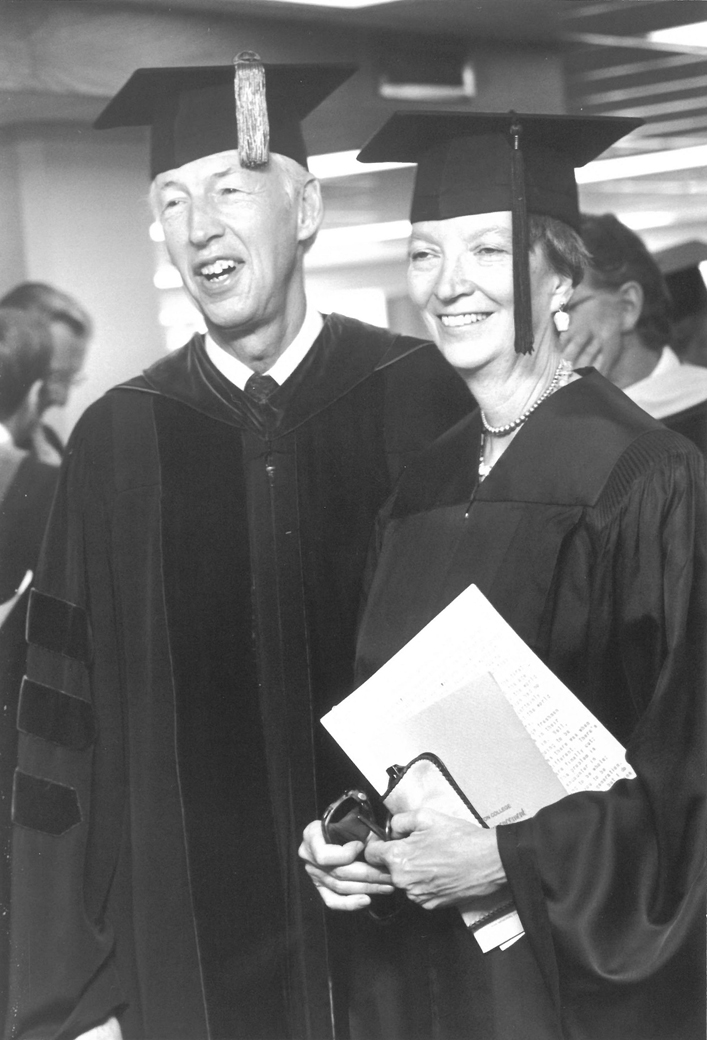
Madeline L’Engle with Hudson Armerding at Commencement
1977
MADELEINE L’ENGLE came to Wheaton to speak on a number of occasions, including at conferences and the 1977 Commencement. Most famous for her novel, A Wrinkle in Time, L’Engle was unafraid of creatively exploring the places where faith and science intertwined. Buswell Library Archives & Special Collections currently holds a Madeleine L’Engle Collection, comprising her manuscripts, correspondences, articles, awards, biographical information, and photos. The collection was largely acquired from materials that L’Engle sent to the College herself.
JONI EARECKSON TADA spoke at commencement in 2005 and also addressed the student body through various Chapel messages. After experiencing a tragic accident when she was 17, Tada became a quadriplegic. She is an author and radio host with a passion for ministering to the disability community. Her ministry, Joni and Friends, has touched millions of people through its programming and radio channel.
FREDERICK BUECHNER, author and theologian, taught literature for a semester at Wheaton in 1985, during which time he gave a chapel address. He also gave a lecture in 1991. Buechner was a celebrated author before coming to know Christ, after which he became a minister and continued to write, but shifted his focus to nonfiction, covering theology, compiling sermon collections, and producing memoirs.
Gilead by MARILYNNE ROBINSON was Wheaton’s 2017–2018 Core Book, a book read by the entire campus community, used to both create a shared experience across campus and shed light on themes across the curriculum. Robinson visited campus that year to discuss her novel, the good life, theology, and the art of writing. Gilead received the Pulitzer Prize, and Robinson received the National Humanities Medal and the Library of Congress Prize for American Fiction.
SOCIAL & POLITICAL FIGURES
JANE ADDAMS lectured at the College in 1894. Addams was the founder of Hull-House, a settlement house on the west side of Chicago. She was active in addressing the issues following industrialization, such as poor housing conditions, maintaining a robust speaking schedule and participating in social organizations.
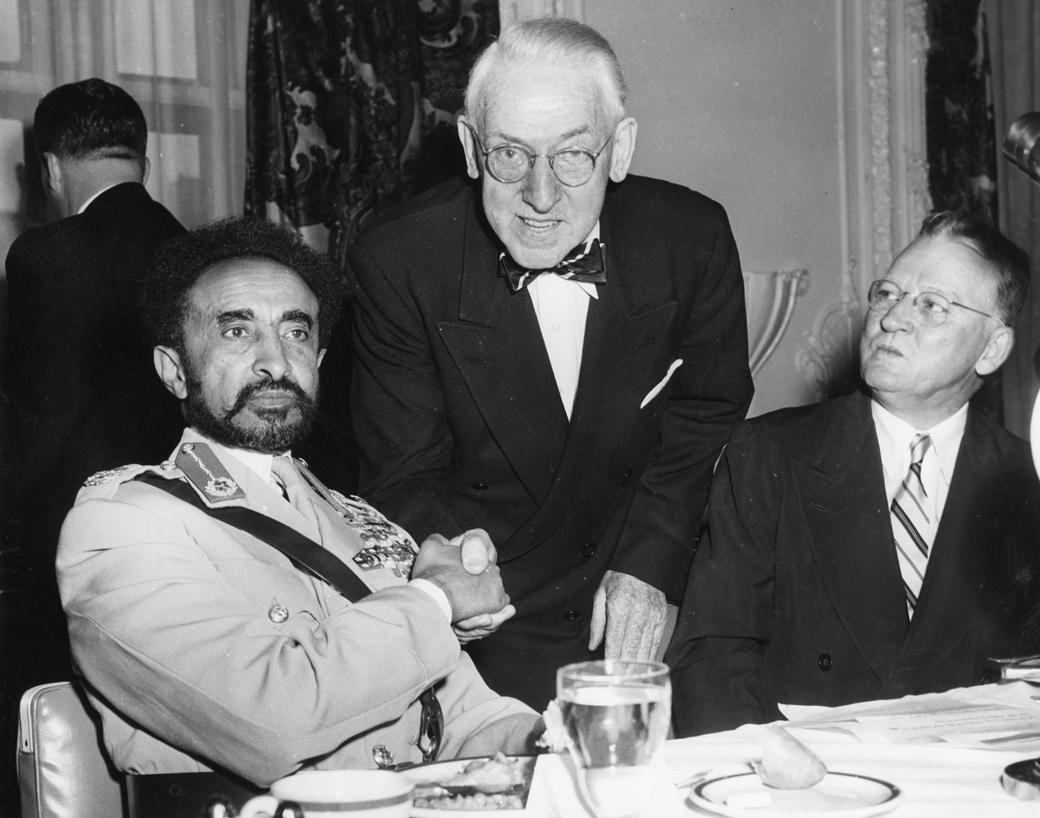
King Haile Salassie I with trustee Joseph Evans
1954
Russian statesman ALEXANDER KERENSKY visited Wheaton College in 1944 and lectured on “Russia and the International Situation.” As a former vice president, minister of justice, and minister of war during Lenin’s first uprising, Kerensky had extensive experience in political dealings. He became the president of the provisional government in 1917 but was quickly overthrown and forced to flee. Following his escape, Kerensky became an advocate for Russian democracy. With WWII still raging and the Soviet Union quickly overpowering much of eastern Europe, his lecture was timely.
KING HAILE SELASSIE I, emperor of Ethiopia from 1930–1974, visited Wheaton College and received an honorary degree in 1949. Selassie was known for his efforts to modernize Ethiopia through the abolition of slavery and the formation of a constitution. This king was the same one Dr. Raymond Edman spoke of in his final chapel talk, “In the Presence of the King.” He recounted visiting Selassie in Ethiopia and the splendor and solemnity of the event. Edman compared this earthly visit to visits with the King of kings through prayer. Soon after drawing this connection, Edman died mid-sermon and joined the presence of the King forever.
Presidents RICHARD NIXON, GERALD FORD, JIMMY CARTER, and RONALD REAGAN visited Wheaton during their campaigns. Nixon came to Wheaton during his candidacy for the Republican nomination in 1960 and held a rally on McCully Field. In 1976, Ford traveled to Wheaton for a rally, during which he spoke on his commitment to higher education and a healthy economy for students to enter upon graduation. He concluded, “America and the world need the moral and spiritual values which you offer. Young men and women, motivated by faith in themselves and in God, must keep the flame of faith burning,” as recorded in the Ford Library Museum. Carter delivered the LeRoy H. Pfund Lecture in 1992, where he spoke on overcoming hopelessness through acts of compassion and justice. Reagan made a brief visit to Wheaton in October 1980, after receiving the Republican nomination.
GEORGE H. W. BUSH spoke at commencement in 1985. It was a notably more successful follow-up to his original visit in March 1980 during the primaries against John Anderson and Ronald Reagan, which only drew a small crowd that barely filled half of Edman Chapel.
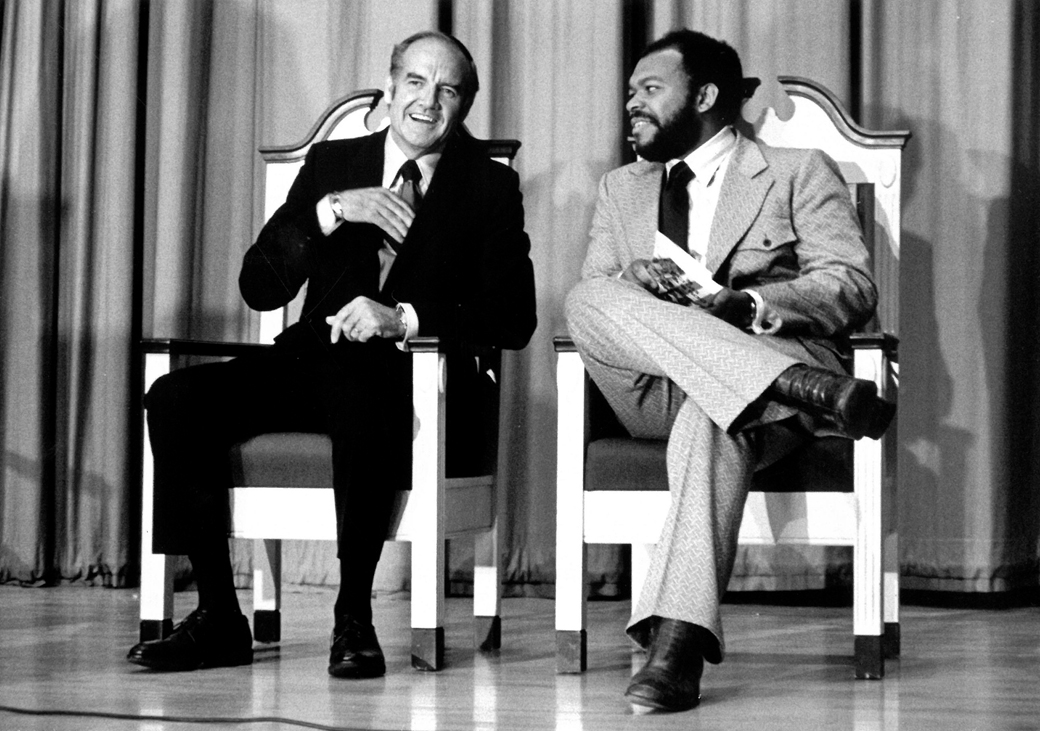
George S. McGovern and Tom Skinner
1972
Democrat GEORGE S. MCGOVERN addressed the student population during Chapel in 1972, where he was received by a small section of supporters and a larger section of dissenters. However, McGovern handled the mixed crowd well. Paul Bechtel, professor of English, said that “challenging ideas were set before the students with conviction, with charitable fairness, with no evidence of hollow political clichés.”
MARK HATFIELD, former governor of Oregon and long-time senator, came to Wheaton College six times between 1960 and 1997. During his first visit, when he spoke at commencement, Wheaton awarded him an honorary doctor of humanities. Following his 1974 visit, a Record article headline read, “He Came, He Spoke, and We Were Conquered: A Sprinkling of Reality, A Hurricane of Hope.” Hatfield was a vibrant Christian and often spoke on the fusing of faith and politics and the responsibility of the church in socio-political action.
Former Special Counsel to President Nixon CHUCK COLSON addressed the graduating classes of 1988 and 2000 at their commencement ceremonies. In 2000, he spoke on “The Corruption of Conscience.” Colson was one of the Watergate Seven that aided and abetted Nixon in the Watergate scandal. He served seven months in prison on the charge of obstruction of justice. Between the Watergate scandal and his trial, Colson went through a radical conversion that set his life in a new direction. After leaving prison, Colson founded Prison Fellowship International and the Colson Center for Christian Worldview, and traveled extensively for speaking engagements.
C. EVERETT KOOP delivered many lectures and Chapel talks from the 1970s through the early 2000s and was the featured speaker at the 1973 Commencement. Some of his key focuses included public health, medical ethics, and providing medical aid for communities in crisis around the globe, and he moderated many panels for the College’s Center for Applied Christian Ethics.
MISSIONARIES & EVANGELISTS
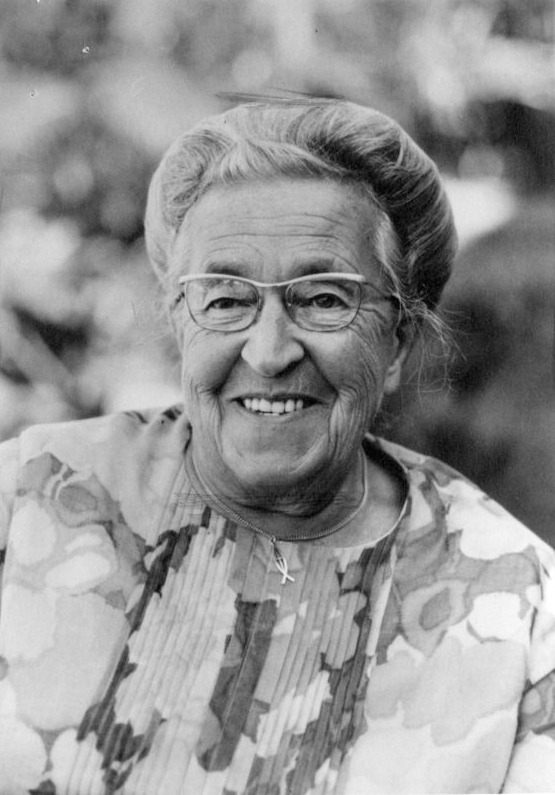
Corrie ten Boom
1974
LELAND WANG, “China’s most eminent evangelist,” spoke in 1938 during Homecoming. Wang was sometimes referred to as the D. L. Moody of China and was the founder of the Chinese Foreign Missionary Union. REV. AND MRS. F. C. BROWN, missionaries to China, came to Wheaton in 1930 to lecture on the problems of racial prejudice in the mission field. HOWARD TAYLOR, son of Hudson Taylor, the founder of China Inland Mission, visited in 1922; he and his wife spoke about the need for missionaries.
The founder of The Lutheran Hour, WALTER MAIER, visited Wheaton frequently in the ’40s to share his radio preaching chops live and in person. On one visit in 1940, the annual Washington Banquet—a now-extinct tradition where students would gather for a program of festivities including class speeches, toasts, songs, dinner, and dressing up in costume—had been canceled. In place of the elaborate event, students gathered in Pierce Chapel, where Maier was the honored guest.
Holocaust survivor CORRIE TEN BOOM gave a Chapel address in 1974 titled “Representatives of Heaven.” While she is most famous for her autobiography, The Hiding Place, ten Boom’s life following her release from the concentration camp was primarily marked by sharing the gospel through her personal testimony. She was an evangelist and global speaker and founded a home for concentration camp survivors. The Wheaton College Buswell Library Archives & Special Collections hold materials from ten Boom’s life both during the Holocaust and after, including family photos, recordings of public lectures, and several of her passports, which point to her evangelistic travels.
ELISABETH ELLIOT ’48 was a visitor at Wheaton following the tragic death of her husband, Jim Elliot ’49. She returned to Ecuador, where she continued ministry to the Waorani and the Quichua, then later moved back to the United States, where she became an adjunct professor at Gordon-Conwell Theological Seminary. She wrote numerous books, and Through Gates of Splendor is a renowned bestseller.
HELEN ROSEVEARE lived in the Congo as a missionary for nearly 20 years. She studied tropical medicine and used her skill to train nurse-evangelists to run clinics in other regions. When civil war broke out in the Congo, she was imprisoned and assaulted. She reflected on these experiences and the suffering Christ in later publications. She came to the College on a number of occasions, including in 1976, 1984, and 1989 for Missions in Focus week.
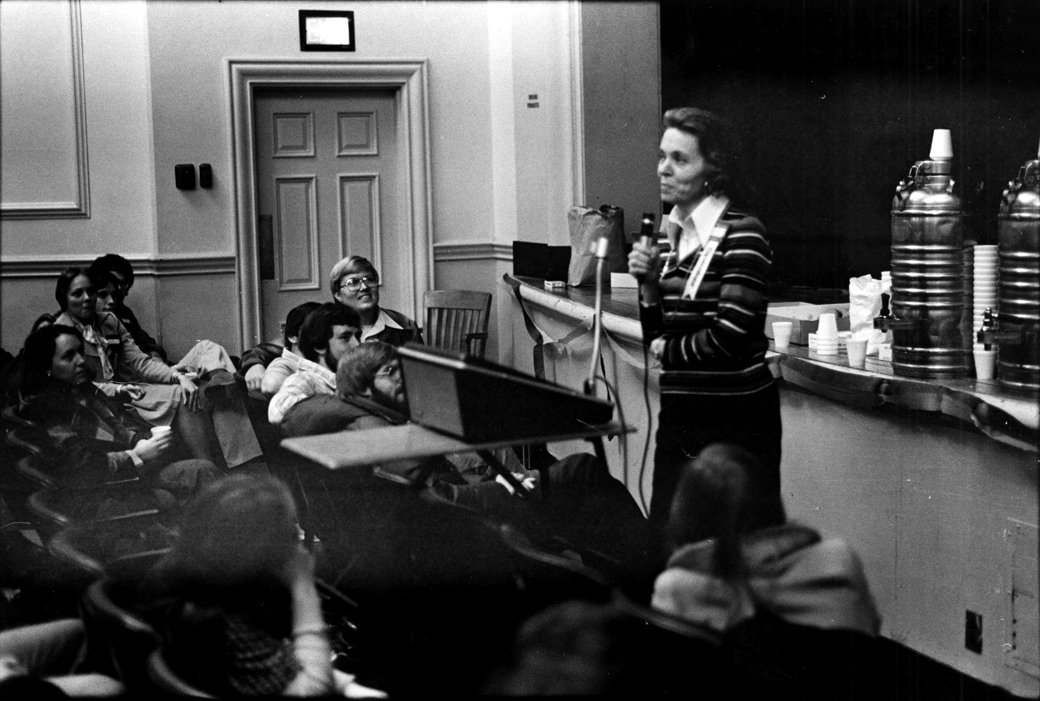
Elisabeth Elliot speaks with Wheaton students
1976
ATHLETES
JAY HANNA “DIZZY” DEAN made an appearance on campus in 1937. Dean was the St. Louis Cardinals’ star pitcher at the time and was invited to speak at the annual football banquet. A Record reporter wrote, “It was the first time in his life he had ever been in a college chapel, but he declared that the thundering, whole-hearted singing and sincerity of the students gave him ‘one of the biggest thrills of his life.’” Dean went on to be inducted into the Baseball Hall of Fame in 1953.
HAROLD “RED” GRANGE returned to his hometown and addressed Wheaton students at chapel in 1978. Grange was a star football player throughout high school and college, as well as during his professional career with the Chicago Bears. His ability to speedily dodge opponents earned him the nickname “Galloping Ghost.” Inducted into the Professional Football Hall of Fame in 1963, Grange is heralded as one of the greatest football players ever.
While this list is extensive, it is hardly comprehensive. Do you remember a particularly impactful guest lecturer? Send an email to editor@wheaton.edu and tell us about them!
